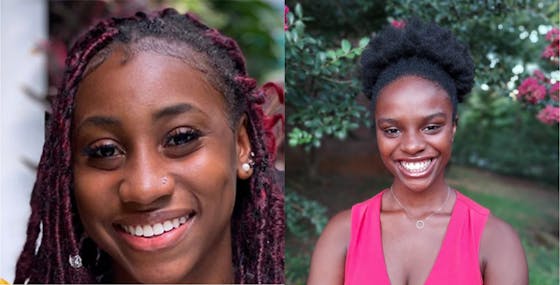‘We created something beautiful’: Two years of the Black Action Plan
Sonali Anderson is one of the primary creators of the Black Action Plan. Almost two years after developing the influential plan, she spoke to the Justice about the progress that has been made and her hopes for the future of anti-racism at Brandeis.
In the summer of 2020, as Black Lives Matter protests against systemic racism and police brutality erupted across the globe in response to the murder of George Floyd and other high profile police killings of Black people in the United States, Sonali Anderson ’22 began thinking about ways to make change happen on an institutional level at Brandeis.
“I was just very moved really to change, or, to combat systemic racism within a community that we had influence over, and that was Brandeis,” Anderson told the Justice during a Zoom interview on May 18.
She started working on coming up with an approach but was not initially planning to take on the main leadership role, thinking that she would need to enlist BIPOC leaders from throughout the Brandeis community to spearhead the effort. It was DeBorah Ault ’22 who made Anderson realize that this wasn’t the only option. “I called her and was just like, ‘This is what I want to do’ … and, you know, she really made me realize, like, we could do it ourselves,” Anderson said, explaining that this was a pivotal moment for her. “It just changed the trajectory of everything, and that is when our partnership really grew.”
Anderson and Ault led a small group of students as they spent the summer researching and meeting with other students, professors, and members of the Brandeis community to compile a list of demands to the University to address institutional racism through structural changes. This list was created based on community input as well as unmet demands from previous student movements, including the Ford Hall 2015 sit-in and the 2019 #StillConcernedStudents protest. In August 2020, the Black Action Plan document was released.

Anderson says that she, Ault, and the other students involved in the BAP knew that making the goals of the BAP a reality would require continued action and involvement. Informed by the varying success of past student-led efforts to combat racism and inequity at Brandeis, Anderson recognized that to create real progress at the departmental and institutional levels, it would take more than just bringing a list of issues and demands to administrators and waiting for change to happen at the hands of the University. She explained that the BAP’s strategy focuses on getting students with the lived experience of being impacted by racism at Brandeis “at the table” where conversations and decisions are happening, a strategy she hopes that students involved with efforts to create change and social justice on campus will take inspiration from moving forward.
Anderson explained that to carry out this strategy following the release of the BAP, the students involved in its creation first organized a phone bank through social media over the two weeks leading up to the start of the fall 2020 semester. During this time, student volunteers called administrators and University departments “every five minutes” to voice support for the demands of the BAP. By the time Anderson arrived on campus for the start of her junior year, the BAP had secured a meeting with University President Ron Liebowitz and other administrators. It was through this meeting that Anderson and BAP co-creator DeBorah Ault were appointed to positions in the University’s Office of Diversity, Equity, and Inclusion, where they were able to work directly alongside administrators, acting as advisors to departments working to develop the University’s Anti-Racism Plans, which were heavily influenced by the BAP. “We wanted the Black Action Plan to be the anti-racism plan at this school,” Anderson said.
Anderson explained that initially, Brandeis was planning to release these plans in September 2020 but put them on hold when the BAP was released. According to Anderson, the original draft of the plans mostly consisted of goals and promises with little focus on how these would be implemented or accomplished. “That was missing and that's what we [BAP] brought to the table,” she said, referring to the lack of concrete plans and action steps in the early draft of the University’s plan.
Brandeis released its official Anti-Racism Plans in December 2021, accompanied by a statement about the BAP’s contribution, which starts off by stating, “The Anti-Racism Plans presented here were developed alongside a bold student initiative known as the Black Action Plan (BAP),” and continuing by acknowledging Anderson and Ault’s role as the leaders of the BAP’s “effort to articulate and incorporate student concerns about the social environment on campus for Black and African American students.”
Anderson and Ault found other ways to advocate for the demands of the Black Action Plan directly within important decision-making spaces at Brandeis. Anderson joined the Board of Trustees as an undergraduate student representative, while Ault became a student representative on the Alumni Association’s Board of Directors. “We put ourselves in places of organizational power,” Anderson explained.
She said that while she feels that Brandeis will only have sufficiently responded to the BAP once all of the demands have been addressed to the fullest extent, she recognizes that making major systemic change takes time, particularly within a bureaucracy such as Brandeis. “It’s not going to happen within a year, it’s not even going to really happen within two years, because with dismantling structures or systemic racism, it’s like pushing mountains,” Anderson said, continuing, “so that takes time and we had to come to that realization.”
One of the changes she cited when discussing the progress that has been made in response to the BAP is the transfer of certain roles and responsibilities — such as lockout assistance — from Public Safety to other campus departments, including the Department of Community Living. While she is very proud of what the BAP has accomplished and the many ongoing efforts currently underway within various departments, she explained that there is always more work to be done: “As long as there is racism, there will always be more things that need to be changed.”
One of the in-progress efforts that Anderson spoke about is the work being done to make the Office of Equal Opportunity’s reporting process more accessible so that community members feel more comfortable reporting instances of racism and other forms of discrimination on campus, particularly when they involve interactions with Public Safety officers, which Anderson said can often be “crazy.”
Anderson will be pursuing an accelerated MBA at the Brandeis International Business School, where she received a Diversity, Equity and Inclusion Scholarship in recognition of her advocacy and activism work, while Ault will be working as an oral historian at The National Museum of African-American History and Culture in Washington, D.C.
Anderson said that as a graduate student, she will continue to be involved with the BAP, albeit in a different capacity. She hopes to use this new role as a Brandeis graduate student to expand the BAP’s work to look at systemic issues that affect graduate students and how these intersect with the systemic racism experienced by undergraduates.
The BAP student organization will be releasing a progress report this coming fall, which will update students and other community members on the changes that have been made and those that are currently underway.
With Anderson and Ault both graduating, other students involved with BAP will be taking on similar roles and positions within the University to carry on the advocacy and advisory work, something Anderson is very pleased about.
Anderson explained that BAP’s primary goal is to see the plan be fully and permanently institutionalized across Brandeis departments, something that they are currently working to achieve alongside Vice President of DEI LeManuel Bitsóí and Vice President of Student Affairs Raymond Ou. “It’s going to be a living thing,” Anderson asserted, “not just, ‘Yes, this happened, and now we’re done.’ It's going to be a continuation.”




Please note All comments are eligible for publication in The Justice.